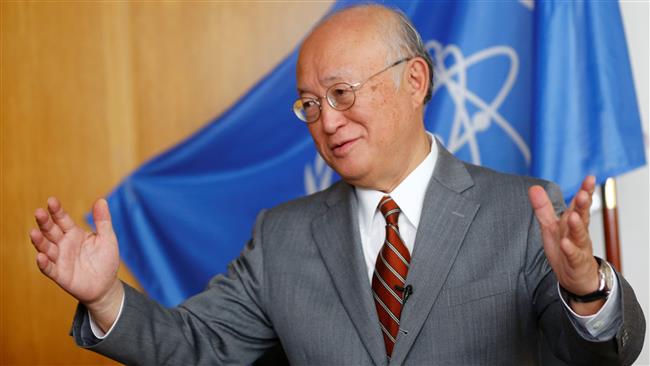IAEA monitoring of Iran deal going on smoothly: Amano

EghtesadOnline: The head of the International Atomic Energy Agency (IAEA) says Iran has been providing the UN nuclear watchdog with all the necessary access it requires to monitor Tehran’s compliance with the 2015 nuclear deal, saying the inspection process is going on smoothly.
In a Tuesday interview with Reuters, Yukiya Amano, reiterated that Iran is in compliance with the provisions of its nuclear deal with the world powers, known as the Joint Comprehensive Plan of Action (JCPOA).
According to PressTV, he noted that the agency’s complementary access to Iran’s nuclear site, which mainly consists of short-notice inspections under the Additional Protocol, continues smoothly.
“Complementary access in Iran is being undertaken without problem and the number of accesses is quite high,” he said.
Iran and the five permanent members of the United Nations Security Council – the United States, France, Britain, Russia and China – plus Germany signed the nuclear agreement on July 14, 2015 and started implementing it on January 16, 2016.
Under the JCPOA, Iran undertook to put limitations on its nuclear program in exchange for the removal of nuclear-related sanctions imposed against Tehran.
The IAEA has repeatedly verified Iran’s adherence to the terms of the JCPOA since January 2016, when the deal took effect.
On Friday, Russia’s Foreign Minister Sergei Lavrov ruled out the idea of reopening negotiations on Iran’s nuclear deal amid US calls for abandoning or reconsidering the agreement.
The US President Donald Trump administration has desperately sought a pretext to scrap or weaken the 2015 deal and get rid of the limits the deal imposes on the US ability to pursue more hostile policies against Iran.
The US Republican president faces an October 15 deadline for certifying that Iran is complying with the deal. If Trump refuses to do that, then the Republican-controlled Congress will have 60 days to decide whether to re-impose sanctions waived under the deal. That would let Congress effectively decide whether to kill the deal.
All other parties to the deal, along with the entire international community, have thrown their weight behind the accord and verified Iran's full commitment to its side of the bargain.
Amano further called on the six world powers to “clarify” Section T of the agreement, which deals with the technology that could contribute to the development of a nuclear explosive device.
The provision lists examples such as using computer models that simulate a nuclear bomb, or designing multi-point, explosive detonation systems.
Russia contends that the IAEA has no authority over Section T, but Western powers oppose Moscow’s argument.
“Our tools are limited” with regard to verification of Section T, Amano said.
“In other sections, for example, Iran has committed to submit declarations, place their activities under safeguards or ensure access by us. But in Section T, I do not see any (such commitment),” he pointed out.
Amano expressed hope that the parties to the JCPOA would discuss the issue in the Joint Commission, a forum created by the deal, noting that a clearer definition of terms mentioned in Section T would improve the situation.
“More clarification would be helpful ... Russia has a different view. They believe that it is not the mandate of the IAEA. Others have different views and discussions are ongoing,” Amano said.
When asked if a successful Iran deal would lay the groundwork for a political solution for the North Korean nuclear weapons crisis, the IAEA chief said that the two cases are quite different, but noted, “I also do not say that there is no comparison, because in the JCPOA’s case, diplomacy worked.”


